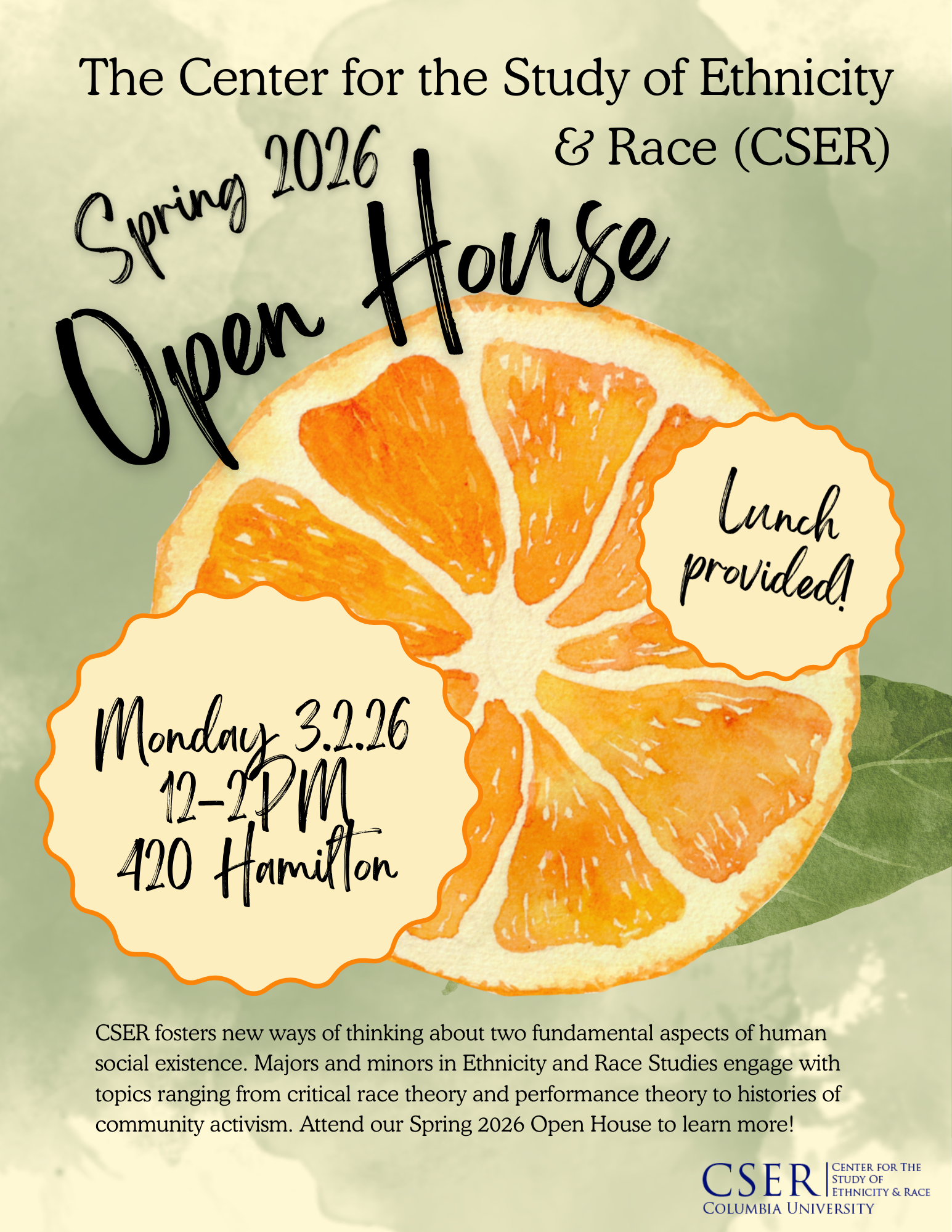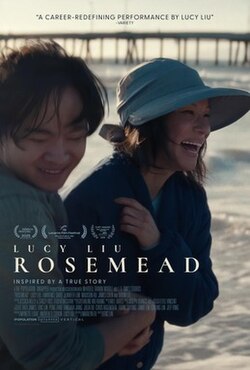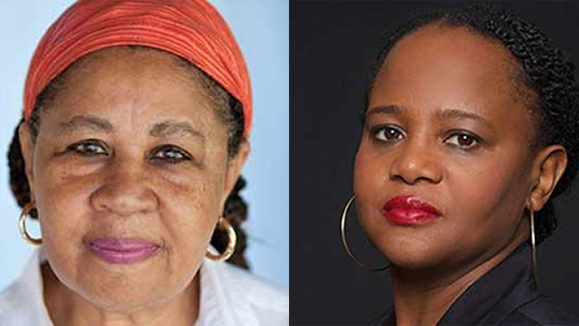
Interested in the study of ethnicity and race? Join us for CSER’s Spring 2026 Open House to learn about pursing a major or minor in Ethnicity and Race Studies!
CSER is Columbia’s main interdisciplinary space for the study of ethnicity and race and their implications for thinking about culture, power, hierarchy, social identities, and political communities. Majors and minors engage with topics ranging from critical race theory and performance theory to histories of community activism.

A screening of this powerful film will be followed by a conversation with Screenwriter Marilyn Fu ’03, Director Eric Lin, and Producer Mynette Louie, Assistant Professor of Professional Practice of Film. Moderated by Qin Gao, Acting Director of the Asian American Initiative.
About Rosemead:
Inspired by the harrowing true story, Lucy Liu transforms in a riveting, career-redefining performance as an ailing woman who takes drastic measures to protect her troubled teenage son (Lawrence Shou). As his dark obsessions grow and time runs out, she is forced to make impossible choices: how far will she go and what is she willing to sacrifice? Set against the simmering tensions of a Chinese American community, Rosemead is a gripping portrait of a family pushed to the edge.
2025 | 97 minutes
Co-presented by the Asian American Initiative and the MFA Film Program at Columbia University School of the Arts.

The Institute for Research in African American Studies and the Department of African American and African Diaspora Studies presents: The Annual Zora Neale Hurston Lecture honors the intellectual fierceness and talents of the singular anthropologist, novelist, and essayist Sister Zora — therefore also honoring our long Black intellectual tradition and its connection to Columbia, and Harlem. A complex figure, Hurston began her career as a Columbia University doctoral student in anthropology at Columbia University.
Her inimitable ‘spyglass’ and sensibilities have forever shifted the literary and anthropological landscapes: demonstrated by her novels “Jonah’s Gourd Vine” and “Their Eyes Were Watching God,” for example; ethnographic and folkloric works, “Mules and Men,” and “Tell My Horse: Voodoo and Life in Haiti and Jamaica;” her extraordinary autoethnographic work, “Dust Tracks on a Road;” short story collections, including “Spunk;” plays, and essays, like “Pet Negro System.”
Jamaica Kincaid is the 2026 Mellon Arts Project Artist-in-Residence in the Department of African American and African Diaspora Studies at Columbia University. The globally acclaimed author of numerous widely taught and translated novels and essays— including “Annie John,” “Lucy,” “A Small Place,” “The Autobiography of My Mother,” and “See Now Then” — the Antiguan-American novelist’s profound intellectual and cultural influence extends far beyond literature, into art, cultural studies, and political thought. She is a professor of African and African American Studies at Harvard University.
Edwidge Danticat is the Wun Tsun Tam Mellon Professor of the Humanities in the Department of African American and African Diaspora Studies at Columbia University. Her most recent essay collection, “We’re Alone,” published in 2025, joins her previous acclaimed works: including “Create Dangerously;” “Breath, Eyes, Memory,” an Oprah Book Club selection; “Krik? Krak,” a National Book Award finalist; “Claire of the Sea Light;” “Brother, I’m Dying,” a National Book Critics Circle Award winner and National Book Award finalist; as well as seven books for children and young adults; and a travel narrative, “After the Dance.”

Join the Barnard Center for Research on Women for the Natalie Boymel Kampen Memorial Lecture with Justine McConnell, McMillan-Stewart Fellow at Harvard University and Reader in Comparative Literature and Classical Reception at King’s College London. McConnell’s lecture, “‘Wayward’ Mythography: Zora Neale Hurston and Ancient Greece,” will be followed by a conversation co-moderated by Monica Miller (Africana Studies, Barnard) and Rosa Andújar (Classics, Barnard). The event will conclude with a Q&A with audience members.
Named in honor of Natalie Boymel Kampen—pioneering feminist scholar and beloved professor of Art History and Women’s Studies who passed away in 2012—this annual lecture celebrates research in women’s history and feminist scholarship. Also presented as part of Barnard’s ongoing centennial celebration of Zora Neal Hurston, McConnell’s work examines how women of the Harlem Renaissance interwove ancient Greek and Roman mythmaking into their own modern narratives.
Accessibility: This event is free and open to the public. ASL interpretation will be provided. Registration is required. A light reception will follow the conversation.
Justine McConnell is Reader in Comparative Literature and Classical Reception at King’s College London. With the support of fellowships at Harvard’s Center for Hellenic Studies (Fall 2025) and Hutchins Center for African and African American Research (Spring 2026), her current research examines the ways in which the women of the Harlem Renaissance engaged with Graeco-Roman antiquity. Justine is the author of Black Odysseys: The Homeric Odyssey in the African Diaspora since 1939 (OUP, 2013), Performing Epic or Telling Tales (co-authored with Fiona Macintosh; OUP, 2020), and Derek Walcott and the Creation of a Classical Caribbean (Bloomsbury, 2023). She has also co-edited four volumes on the reception of the ancient Mediterranean.
Monica L. Miller is Chair and Professor of Africana Studies at Barnard College, Columbia University. A leading voice in Black fashion and dress studies, Monica also teaches and writes about Black literature, art, performance, and contemporary Black European culture. She was the Guest Curator of Superfine: Tailoring Black Style, the 2025 Costume Institute exhibition at The Met, which was inspired by her book, Slaves to Fashion: Black Dandyism and the Styling of Black Diasporic Identity. Professor Miller is also one of the coordinators for Barnard’s celebration of Zora Neale Hurston ‘28 and 100 Years of Black Students at Barnard. Miller’s work has been supported by the Andrew W. Mellon Foundation, the Schomburg Center for Research in Black Culture, and the Institute for Citizens and Scholars; she is a frequent commentator in the media and arts worlds.
Rosa Andújar is Associate Professor of Classics and Ancient Studies at Barnard. Her research addresses ancient Greek drama and its modern global reception, particularly in Latin America and the Caribbean as well as among Latinx communities in the US. She is the author of Playing the Chorus in Greek Tragedy (Cambridge, 2025) and the editor of The Greek Trilogy of Luis Alfaro (Methuen Drama, 2020), which won the 2020 London Hellenic Prize. She is currently completing a second monograph entitled Tragedy and Revolución: Ancient Greek Drama as Political Theater in the Hispanic Caribbean, which is under contract with Yale University Press. She joined Barnard in January 2026.
The Institute for the Study of Comparative Literature (ICLS) will host the Technopolitical Form and the Global South symposium.
Organizers: David Bering-Porter (New School), Joshua Neves (Concordia), and Arvind Rajagopal (NYU)
Registration: Please RSVP at this link. Registration will be capped at 40, as this is meant to be an intimate workshop.
Is a philosophy of technology out-of-date even as it arrives, just as Minerva’s owl takes flight only at dusk? Even so, the idea of technopolitical form has arguably been influential, if only as concrete thought or as real abstraction. If struggle becomes political only by acquiring form, the modes of mediating form are technopolitical. Technopolitical form names a battlefield where alliances across race, class, nationality and sexuality are targeted and interdicted if possible, in the face of insurgence and resolute assertion.
If Empire appeared as a deterritorializing force at the beginning of the century, the disintermediation of imperial force today is reminiscent of territorialized authority. But now, the territory is that of the imagination. The vacuum of absolute space has turned into an interior geography of knowns and unknowns, of allies and aliens. Against the conventional view that information supersedes form, we ask: if the content of technopolitics is anti-imperial, what forms does it take, and what forms could it take?
If colonialism has always operated through the extraction of resources, the conscription of labor, and the appropriation of knowledge, these emergent regimes may represent its latest and most intimate formation, one in which the human subject itself becomes the territory to be colonized. Generative AI and the digital doppelgänger extend colonial logics through dispossession, enclosure, and substitution, mapping human capacity as planetary resource and positioning the Global South as both the site of extraction and the spectral labor force training the very systems that disavow its contributions. What technopolitical forms have been inherited, are emergent, or are yet to be imagined and how might we contest this interior colonization of the imagination?
Our symposium takes up the question of technopolitical form at a moment when the so-called Fourth Industrial Revolution envisions all domains of life rendered as operational data; as vitality decomposed into discrete, manipulable, and interoperable units that can be isolated, stored, exchanged, and accorded value across time, space, and context. If technopolitical narratives have shifted from mid-century critiques of disequilibria and planetary exhaustion toward regimes of optimization operating at molecular and metabolic scales, what forms of political imagination become possible or foreclosed? How do we understand a new geography of late industrialism oriented not toward twentieth-century notions of core and periphery but toward the production of relative surplus value at a planetary scale, and what anti-imperial forms might emerge from or against it?
Participants: Sareeta Amrute (New School), Ahmed Ansari (NYU), Neda Atanasoski (University of Maryland), Sudipto Basu (Concordia), David Bering-Porter (New School), Heather Davis (New School), Aditi Dey (New School), Christine Goding-Doty (New School), Shikhar Goel (NYU), Debashree Mukherjee (Columbia), Joshua Neves (Concordia), Emma Park (New School), Arvind Rajagopal (NYU)

The symposium brings together scholars working across and beyond Middle East and North Africa studies to explore how discursive fields are constituted, and to ask what becomes possible when we read across and against established disciplinary and regional boundaries. Rather than simply juxtaposing area studies frameworks (e.g., Syria or Palestine), we aim to theorize “the regional” anew. This conversation began as an exchange around Syro-Palestine, reflecting on how regional fields—particularly those of Lebanon, Turkey, Tunisia, and Algeria—have been positioned in relation to the Question of Palestine. This positioning has tended to circumscribe the terrain of inquiry, foreclosing other narratives, epistemologies, and questions. Our symposium aims to explore a conceptual vocabulary that resists colonial inheritances and disciplinary segmentation, and that reimagines scholarly methods through forms of relation not yet captured by dominant frameworks.
The two-day program includes a Thursday evening keynote panel featuring four speakers, open to the public and the Columbia community, followed by three closed-door sessions on Friday with a cohort of invited scholars.
SYMPOSIUM CO-ORGANIZERS:
- Aamer Ibraheem, Assistant Professor in the Department of Anthropology at the University of California, Davis, and a Mellon Postdoctoral Fellow at the Society of Fellows and Heyman Center for the Humanities at Columbia University.
- Adrien Zakar, Assistant Professor of Middle East Studies and the History of Science and Technology, University of Toronto
- Esmat Elhalaby, Assistant Professor in History, University of Toronto
- Iheb Guermazi, The Society of Fellows and Heyman Center for the Humanities at Columbia University

From the Barnard Center for Research on Women (BCRW): Why AI Needs Feminism brings together feminist critical technologists Lauren Klein (Emory University) and Meredith Broussard (NYU) with Barnard’s Saima Akhtar (Vagelos Computational Science Center) and Gabrielle Gutierrez (Neuroscience) to examine how algorithmic surveillance is reshaping everyday life—from predictive policing in New York neighborhoods of color to the data infrastructures sustaining global conflicts and occupations. This conversation challenges the myth of “data-driven decision-making” as neutral progress and asks how feminist approaches grounded in care and accountability can offer paths toward refusal and repair.
Across higher education, including at Barnard, the rapid adoption of AI reflects wider struggles over power and control. “Smart” campus security systems and learning analytics promise efficiency and personalization while quietly expanding surveillance of movement, behavior, and intellectual labor. While AI can support learning and connection, it is also worth discussing how it reinforces existing hierarchies or privileges efficiency over care, trust, and human judgment.
The feminism AI needs, we insist, is not the mainstream feminism of representation or inclusion alone, but one that confronts how race, class, gender, and colonial power are built into technological systems. We ask: Who designs and benefits from these systems? Who bears their risks? And what would it mean to build technologies guided by care rather than oversight and control?
This event invites collective critique and imagination—toward technologies and institutions that center people, not just data.
This event is free and open to the public. Registration is required. A light reception will follow the conversation.

